Non-ferrous metal examples are those metals which do not have iron in them. All the pure metals in the periodic table are non-ferrous except for iron. Let us discuss various non-ferrous metal examples.
The most prominent and popular non-ferrous metal examples are listed below:
Aluminium
Aluminium is a non-ferrous metal example because it does not have any amount of iron in it. It is widely used as an alloy because of the same reason. In its unionized form it is silvery and ductile which makes it a weak non-ferrous metal example. Apart from that it can form a protective oxide layer which reduces the risk of corrosion.
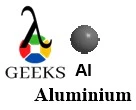
Copper
Copper is another popular non-ferrous metal example because it can be used in alloys and has no ferrite content in it. Like aluminium, it is soft and ductile and not strong at all. As a major and popular non-ferrous metal example it has applications in various electrical components, decorative items, currency and strengthening of alloys.
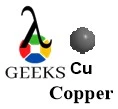
Lead
Lead is a non-ferrous metal example because it is easily extractable from ores in its purest form, unlike iron. It is an unreactive post-transition element and of weak metallic character due to its amphoteric nature. It also has a self-bonding property which makes it a strong candidate for non-ferrous metal examples.

Zinc
Zinc is a non-ferrous metal example due to its brittle nature and stability which is an anomalous behavior among transition metals. It is diamagnetic which contributes to its stability and conductance. It is more reactive than iron, but it is resistant to corrosion which makes it a suitable candidate as an iron protector. This method of forming a protective coating of zinc on iron is called galvanization.
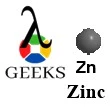
Tin
Tin is a non-ferrous metal example because unlike iron it is a soft metal which can be cut or bent with little force. Tin shows similarity to lead and is malleable and ductile like other non-ferrous metal examples. It cannot be corroded easily. It is specifically used in the process of smouldering and plating.
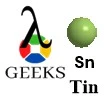
Gold
Gold is considered a precious non-ferrous metal example due to its favorable characteristics in alloy formation. It has higher conductivity, less resistance and flexibility to mold into any shape which is the opposite of ferrous metals and their alloys. It is least reactive and can exist in a solid state in its free elemental or native form.

Platinum
Platinum is a non-ferrous metal example because it is a precious metal which shows properties better than iron when in metallurgy. Platinum is the least reactive and has remarkable resistance to rusting even in extreme conditions, unlike iron. Due to its non-ferrous properties and rarity, it is used in making laboratory equipment, dentistry equipment, jewelry, catalytic converters etc.

Nickel
Nickel is a non-ferrous metal example because it does not rust like other non-ferrous metal examples. But it is different from its counterparts in terms of toughness and rigidity where it can work well in both high and low temperature conditions. Nickel as a non-ferrous metal example is a perfect candidate for alloy formation due to superior mechanical properties.
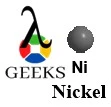
Silver
Silver as non-ferrous metal example is shiny, lustrous and exhibits high electrical conductivity and reflectivity as compared to other non-ferrous metal example. As compared to gold it has less malleability and ductility and is relatively weak.

Conclusion
In nutshell, all non-ferrous metal examples show similar types of characteristics and properties. All of these metals do not have iron content in them and are malleable, ductile, exhibit resistance to corrosion, and are stable and non-reactive with good conductance to electricity.
Read more about 13 Ferrous Metals Examples.

Hello, I am Mansi Sharma, I have completed my master’s in Chemistry. I personally believe that learning is more enthusiastic when learnt with creativity. I am a Subject Matter Expert in Chemistry.
Let’s connect through LinkedIn: https://www.linkedin.com/in/mansi-sharma22